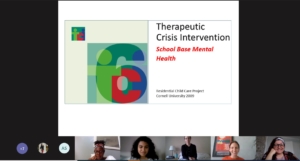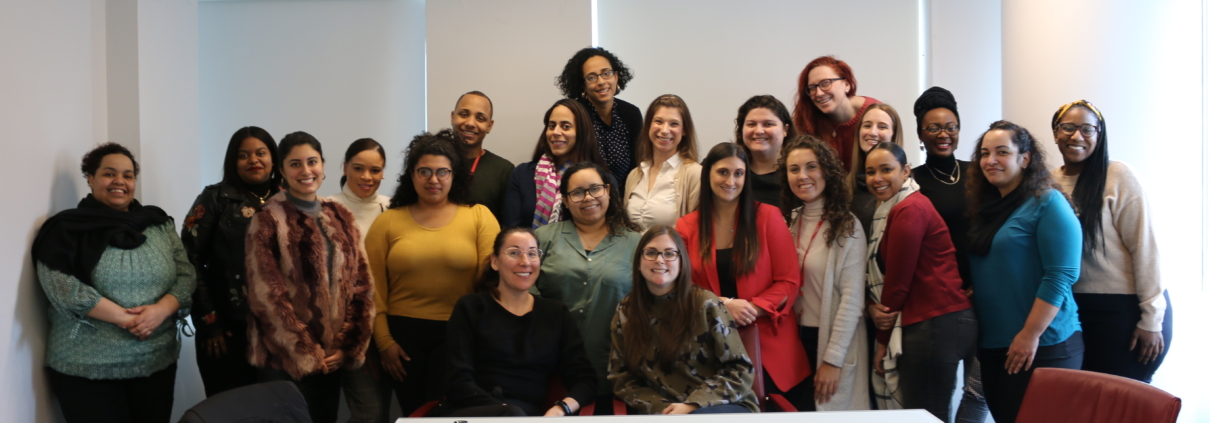Our Work Continues: School Based Mental Health Services still Mitigating Crises
For over 150 years, The New York Foundling has worked in partnership with our neighbors to ensure that everyone can meet their full potential when facing challenging situations. This hasn’t changed, and our staff continue to provide life-changing and meaningful support in light of the COVID-19 pandemic. This series shares how The Foundling’s many programs are responding to the needs of their community.
The Foundling’s School Based Mental Health Services team embeds staff within partnered New York City public schools to identify and address the individual mental health needs of students. Trained staff work with the school to develop and monitor intervention plans for in-school counseling as well as provide referrals out to community-based services.
The program works to educate families about emotional wellness while identifying children and teenagers in need of mental health services. In each partner school, staff aim to promote engagement with families, establish physical environments that encourage participation in services when needed, create processes that facilitate prompt referral, and incorporate evidence-based treatment practices.
Launched in 2014, the School Based Mental Health Services program is based on a growing body of evidence showing that an integrated focus on academics, health and mental health services, social services, expanded learning opportunities, positive youth development, and family and community supports are critical to improving student achievement. Schools that utilize this approach are often referred to as community schools.
In the face of COVID-19, our dedicated clinicians and support staff are adapting, so they can provide the same level of services to young people, their families, and the school community.
 As of April, the School Based Mental Health Services team has provided Telehealth treatment to 212 students and families, 277 therapeutic sessions, and helped schools respond to six community member mental health crises. Unsurprisingly, these statistics are on par with our impact when schools are in session, demonstrating the team’s adaptability as well as the essential nature of the program.
As of April, the School Based Mental Health Services team has provided Telehealth treatment to 212 students and families, 277 therapeutic sessions, and helped schools respond to six community member mental health crises. Unsurprisingly, these statistics are on par with our impact when schools are in session, demonstrating the team’s adaptability as well as the essential nature of the program.
Last year, the School Based Mental Health Services program served approximately 1,000 kids across its 30 partnering elementary, middle, and high schools. “We are in every New York City neighborhood except Brooklyn, which we hope to expand into,” notes Assistant Vice President Elizabeth Tremblay.
Assistant Vice President Bonnie Loughner, who oversees the program alongside Elizabeth, adds: “We are there to help the greater school community meet their students’ social-emotional and academic needs. If any kids are starting to rise to the level of depressed or anxious, we’re there to teach them skills to work through their symptoms.”
Should a crisis situation arise, the School Based Mental Health Services team is ready. When the pandemic began, Elizabeth and Bonnie sat down with their team to assess how their crisis response might change. “We’re following the same procedures as before, but instead of it being in-person, it’s all done via Telehealth now,” Bonnie explains.
“It has been exciting to see the clinicians and youth adapt to telehealth,” Stephanie Riley, a program supervisor, expresses, “the staff have been so open and creative in trying new engagement strategies such as scavenger hunts and incorporating them into therapy.”
Crisis cases typically involve self-harm or suicidal thoughts. In those situations, the program’s staff are the school community’s first responders. “Pre-COVID-19, the student would be brought to our assigned rooms at the school for a full, in-person assessment,” Elizabeth says, “But the advantage of having to do that assessment by video now is that we actually get to see the student’s home. That allows us to work with the family and create an even better safety plan—one that’s tailored to the student’s specific home situation in that moment.”
But mental health doesn’t just exist in the therapy room or on video conferences. The program also works closely with the PTA and school staff to bring mental health resources and awareness to the broader school community, including workshops for students, parents, and teachers. Workshops focus on topics like mental health stigma, behavior management in the classroom, identifying suicidal ideation, and anxiety management techniques. “All our workshops are done virtually now,” Bonnie says, “We’ve also pre-recorded staff trainings for teachers to use.”
Before COVID-19, the program staff would also conduct classroom observations and work with teachers to incorporate social-emotional learning into the classroom. Though this is now difficult, staff have had many teachers contact the program to manage their own stress and to learn how to better support students during this time.
Despite the many challenges posed by the pandemic, recently, the team launched a new partnership with The Foundling’s charter school, Haven Academy. The new initiative will bring the evidence-based model, Incredible Years, to Haven Academy scholars. Used in other elementary schools served by the School Based Mental Health team, Incredible Years is designed for 4 to 6 year-old children, and uses puppets and roleplaying to teach academic and social-emotional skills like sharing and persistence.
“We’re using video vignettes and roleplaying scenarios via videoconference,” Bonnie explains, describing the evidence-based therapeutic interventions they provide. A version designed for parents has similar content, but it teaches the parents how to apply those lessons with their 6 to 12 year-old children at home. Both groups last approximately 16 to 18 weeks, encouraging families to create healthy households where mental health concerns are destigmatized.
“Overall, we’ve seen increased school engagement,” Bonnie says, “School staff and administrators were harder to track down before, but now that everyone is working from home, a lot of schools are having weekly meetings with us. Pre-COVID-19, those meetings were only taking place once, maybe twice a month. It makes me really hopeful for the future that we are setting new expectations for more regular meetings and communications.”
To learn more about how The New York Foundling is responding to the COVID-19 pandemic in New York, visit our emergency response page. Stay tuned for more stories from the frontlines as we continue to support our neighbors on paths to stability and strength.

